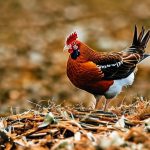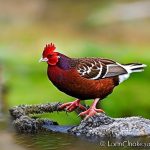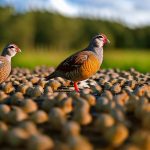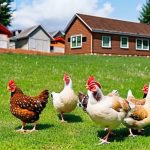Chickens, like all animals, have specific needs that must be met for them to thrive, especially during winter. Understanding these requirements is essential for ensuring the health and well-being of a flock. In colder months, chickens need warmth, protection from the elements, access to fresh water, and a nutritious diet to maintain their body temperature and energy levels.
Proper ventilation is necessary to prevent respiratory issues, and adequate lighting helps maintain their natural circadian rhythms. Failure to meet these needs can lead to decreased egg production, illness, and mortality. Therefore, chicken owners must be aware of their birds’ specific requirements during winter.
Chickens are particularly vulnerable to cold temperatures due to their small body size and limited insulating feathers. They are at risk of frostbite on their combs and wattles, which can be painful and potentially life-threatening if untreated. Additionally, chickens require more energy to stay warm in winter, necessitating a higher calorie intake compared to warmer months.
Understanding these needs is crucial for providing proper care for a flock during winter. By recognizing the challenges that cold weather presents for chickens, owners can take proactive measures to ensure their comfort and well-being.
Table of Contents
- 1 Providing Proper Shelter and Insulation
- 2 Using Heat Lamps and Heated Waterers
- 3 Utilizing Bedding and Nesting Materials
- 4 Offering Nutritious and Calorie-Dense Feed
- 5 Allowing for Sunlight and Outdoor Access
- 6 Monitoring and Adjusting as Needed
- 7 FAQs
- 7.1 What are the best ways to keep backyard chickens warm in winter?
- 7.2 How can I insulate my chicken coop for winter?
- 7.3 Is it safe to use heat lamps or heated pads for backyard chickens in winter?
- 7.4 How can I ensure good ventilation in the chicken coop during winter?
- 7.5 What are some signs that my backyard chickens are too cold in winter?
Key Takeaways
- Chickens need extra care in winter due to their susceptibility to cold temperatures and frostbite
- Proper shelter and insulation are essential to protect chickens from harsh weather conditions
- Heat lamps and heated waterers can help maintain a comfortable environment for chickens
- Bedding and nesting materials provide warmth and comfort for chickens during winter
- Nutritious and calorie-dense feed is important to help chickens maintain their body temperature and energy levels
- Sunlight and outdoor access are beneficial for chickens’ mental and physical well-being
- Regular monitoring and adjustments to the winter care routine are necessary to ensure the health and safety of chickens
Providing Proper Shelter and Insulation
Insulating the Coop
A well-constructed coop is essential for protecting your flock from cold temperatures, wind, and precipitation. The coop should be insulated to retain heat and prevent drafts, but it should also have adequate ventilation to prevent moisture buildup, which can lead to respiratory issues.
Raising the Coop and Providing Bedding
The coop should be raised off the ground to prevent dampness and provide a dry environment for the chickens. In addition to a well-insulated coop, providing adequate bedding is crucial for keeping chickens warm in winter. Deep litter bedding, such as straw or wood shavings, can provide insulation and warmth for the chickens while also absorbing moisture.
Maintaining a Clean and Healthy Environment
This helps to maintain a dry and comfortable environment for the birds. It’s important to regularly clean and replace bedding to prevent the buildup of ammonia and bacteria, which can be harmful to the chickens’ respiratory health. By ensuring that your chickens have a well-insulated coop with proper bedding, you can help them stay warm and healthy throughout the winter months.
Using Heat Lamps and Heated Waterers

In some cases, especially in extremely cold climates, supplemental heat may be necessary to keep chickens warm during winter. Heat lamps can be used to provide additional warmth in the coop, especially during particularly cold nights. It’s important to position heat lamps safely to prevent fire hazards and ensure that they are out of reach of the chickens to avoid burns or injuries.
Additionally, using heated waterers can prevent water from freezing, ensuring that chickens have access to fresh water at all times. Dehydration can be a serious issue in winter, so it’s crucial to provide a consistent source of unfrozen water for your flock. While heat lamps and heated waterers can be beneficial in extreme cold, it’s important to use them with caution.
Overheating can be just as dangerous as cold temperatures for chickens, so it’s essential to monitor the temperature in the coop and adjust heating sources accordingly. Additionally, using thermostatically controlled heating devices can help regulate the temperature and prevent overheating. By using heat lamps and heated waterers responsibly, you can provide your chickens with the extra warmth they need to stay healthy during the winter months.
Utilizing Bedding and Nesting Materials
Bedding and nesting materials play a crucial role in keeping chickens comfortable and warm during winter. Deep litter bedding not only provides insulation but also serves as a comfortable surface for chickens to rest on. It’s important to regularly add fresh bedding to maintain warmth and cleanliness in the coop.
Additionally, providing nesting materials such as straw or shredded paper can help keep eggs warm and prevent them from freezing in cold temperatures. In addition to providing bedding and nesting materials inside the coop, it’s important to ensure that nesting boxes are well-insulated and draft-free. This will help keep eggs warm and prevent them from freezing, which can cause them to crack or spoil.
By utilizing proper bedding and nesting materials, you can create a cozy and comfortable environment for your chickens during the winter months.
Offering Nutritious and Calorie-Dense Feed
During winter, chickens require a higher calorie intake to maintain their body temperature and energy levels. Providing a nutritious and calorie-dense feed is essential for meeting this increased energy demand. Feeds with higher protein and fat content can help chickens stay warm and maintain their energy levels in cold weather.
Additionally, offering supplemental treats such as scratch grains or mealworms can provide extra calories and entertainment for the chickens. It’s important to monitor your flock’s feed consumption during winter to ensure that they are getting enough calories to stay warm and healthy. Adjusting their feed rations as needed based on their energy levels and body condition can help prevent weight loss and maintain their overall health.
By offering nutritious and calorie-dense feed, you can help your chickens stay strong and healthy throughout the winter months.
Allowing for Sunlight and Outdoor Access

The Importance of Sunlight
Sunlight provides chickens with essential vitamins and promotes their overall well-being. It’s vital for their health and happiness.
Outdoor Access for Exercise and Natural Behaviors
Allowing chickens outdoor access also provides them with opportunities for exercise and natural behaviors such as scratching and dust bathing. These activities are crucial for their physical and mental health.
Providing Sheltered Areas
When allowing outdoor access in winter, it’s essential to provide sheltered areas where chickens can seek refuge from wind and precipitation. This can include covered runs or shelters that provide protection from the elements while still allowing access to fresh air and sunlight.
Monitoring and Adjusting as Needed
Finally, it’s crucial to monitor your flock regularly during winter and make adjustments as needed to ensure their health and comfort. This includes checking for signs of cold stress such as huddling together, shivering, or decreased activity. If these signs are present, it may be necessary to provide additional heat or insulation in the coop.
Additionally, monitoring your flock’s overall health and egg production can help you identify any issues early on and make necessary adjustments to their care. This may include adjusting their feed rations, providing supplemental heat or light, or addressing any respiratory issues that may arise due to poor ventilation. By staying vigilant and making adjustments as needed, you can ensure that your chickens stay healthy and comfortable throughout the winter months.
Regular monitoring allows you to address any issues promptly and provide your flock with the care they need to thrive even in the coldest of seasons. In conclusion, caring for chickens in winter requires a thorough understanding of their specific needs during this challenging time of year. Providing proper shelter and insulation, using heat lamps and heated waterers responsibly, utilizing bedding and nesting materials, offering nutritious feed, allowing for sunlight and outdoor access, and monitoring your flock regularly are all essential components of winter chicken care.
By taking proactive measures to meet these needs, you can ensure that your flock stays healthy, comfortable, and happy throughout the winter months.
If you’re looking for more information on keeping backyard chickens warm in winter, you might also be interested in learning about when guinea fowl lay eggs. Check out this article to learn more about the breeding habits of guinea fowl and how to care for them.
FAQs
What are the best ways to keep backyard chickens warm in winter?
Some of the best ways to keep backyard chickens warm in winter include providing a well-insulated coop, using heat lamps or heated pads, and ensuring good ventilation while avoiding drafts.
How can I insulate my chicken coop for winter?
You can insulate your chicken coop for winter by adding extra bedding, sealing any drafts, and using insulating materials such as foam board or straw bales. It’s important to ensure that the coop remains well-ventilated despite the insulation.
Is it safe to use heat lamps or heated pads for backyard chickens in winter?
It can be safe to use heat lamps or heated pads for backyard chickens in winter, but it’s important to follow safety guidelines to prevent fires and ensure the well-being of the chickens. Make sure the heat source is securely installed and not in direct contact with flammable materials.
How can I ensure good ventilation in the chicken coop during winter?
You can ensure good ventilation in the chicken coop during winter by providing adjustable vents, using a ridge vent, and keeping the coop clean to prevent moisture buildup. Good ventilation is important for maintaining air quality and preventing respiratory issues in the chickens.
What are some signs that my backyard chickens are too cold in winter?
Some signs that your backyard chickens are too cold in winter include huddling together for warmth, decreased egg production, shivering, and frostbite on their combs or feet. It’s important to monitor your chickens closely and make adjustments to their environment as needed.
Meet Walter, the feathered-friend fanatic of Florida! Nestled in the sunshine state, Walter struts through life with his feathered companions, clucking his way to happiness. With a coop that’s fancier than a five-star hotel, he’s the Don Juan of the chicken world. When he’s not teaching his hens to do the cha-cha, you’ll find him in a heated debate with his prized rooster, Sir Clucks-a-Lot. Walter’s poultry passion is no yolk; he’s the sunny-side-up guy you never knew you needed in your flock of friends!







